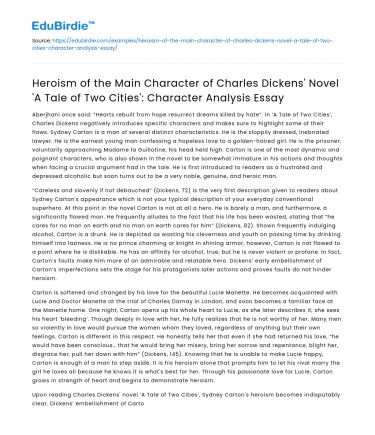Aberjhani once said: “Hearts rebuilt from hope resurrect dreams killed by hate”. In ‘A Tale of Two Cities’, Charles Dickens negatively introduces specific characters and makes sure to highlight some of their flaws. Sydney Carton is a man of several distinct characteristics. He is the sloppily dressed, inebriated lawyer. He is the earnest young man confessing a hopeless love to a golden-haired girl. He is the prisoner, voluntarily approaching Madame la Guillotine, his head held high. Carton is one of the most dynamic and poignant characters, who is also shown in the novel to be somewhat immature in his actions and thoughts when facing a crucial argument had in the tale. He is first introduced to readers as a frustrated and depressed alcoholic but soon turns out to be a very noble, genuine, and heroic man.
“Careless and slovenly if not debauched” (Dickens, 72) is the very first description given to readers about Sydney Carton's appearance which is not your typical description of your everyday conventional superhero. At this point in the novel Carton is not at all a hero. He is barely a man, and furthermore, a significantly flawed man. He frequently alludes to the fact that his life has been wasted, stating that “he cares for no man on earth and no man on earth cares for him” (Dickens, 82). Shown frequently indulging alcohol, Carton is a drunk. He is depicted as wasting his cleverness and youth on passing time by drinking himself into laziness. He is no prince charming or knight in shining armor, however, Carton is not flawed to a point where he is dislikable. He has an affinity for alcohol, true, but he is never violent or profane. In fact, Carton’s faults make him more of an admirable and relatable hero. Dickens’ early embellishment of Carton’s imperfections sets the stage for his protagonists later actions and proves faults do not hinder heroism.
Carton is softened and changed by his love for the beautiful Lucie Manette. He becomes acquainted with Lucie and Doctor Manette at the trial of Charles Darnay in London, and soon becomes a familiar face at the Manette home. One night, Carton opens up his whole heart to Lucie, as she later describes it, she sees his heart ‘bleeding’. Though deeply in love with her, he fully realizes that he is not worthy of her. Many men so violently in love would pursue the women whom they loved, regardless of anything but their own feelings. Carton is different in this respect. He honestly tells her that even if she had returned his love, “he would have been conscious… that he would bring her misery, bring her sorrow and repentance, blight her, disgrace her, pull her down with him” (Dickens, 145). Knowing that he is unable to make Lucie happy, Carton is enough of a man to step aside. It is his heroism alone that prompts him to let his rival marry the girl he loves all because he knows it is what's best for her. Through his passionate love for Lucie, Carton grows in strength of heart and begins to demonstrate heroism.
Upon reading Charles Dickens' novel ‘A Tale of Two Cities’, Sydney Carton's heroism becomes indisputably clear. Dickens’ embellishment of Carton as a flawed man merely elevates Carton as a hero, demonstrating how ordinary, struggling human being can become extraordinary. Dickens gradually details Carton’s character growth as his love for Lucie Manette causes him to act of greatness. Far from the inebriated lawyer, he now “holds a sanctuary in the hearts” of many (Dickens, 364). He has laid down his life for the woman he loves and in doing so he proved himself to be a genuine and very noble man. He is still Sydney Carton, but now undoubtedly, he is a hero.






 Stuck on your essay?
Stuck on your essay?

